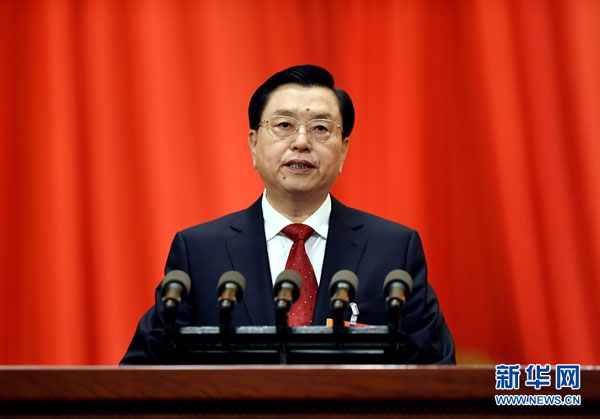 |
|
China's top legislator Zhang Dejiang delivers a work report at a a plenary meeting of theNational People's Congress'?annual session in Beijing March 8, 2014.[Photo/Xinhua] |
Amendments to China's Legislation Law are expected to limit arbitrary administrative orders of local governments, according to law experts, Xinhua reported.
Legislators will review draft amendments at the Third Session of the 12th National People's Congress.
It will be the first time draft revisions to the law, which regulates the process of creating national laws, government regulations and local laws and defines legislative powers in the country, are discussed by NPC deputies at a full session of the national legislative body.
The Legislation Law, enacted in 2000, has been tabled for revisions twice - in August and December last year.
Some Chinese cities issued orders restricting the number of properties individuals can buy to limit real estate speculation. Others eased gridlock by restricting traffic access to roads based on license plates, regularly and on special occasions.
Such orders frequently sparked controversy as they were often abruptly announced.
For example, the government of Shenzhen, Guangdong province, suddenly announced on Dec 29 last year that it would require prospective car buyers to acquire license plates via either a lottery or auction system and the decision would go into effect less than 30 minutes after it was announced.
In a letter to the Legal Office of Guangdong Province, Gu Dasong, a professor of transportation law at Southeast University, requested the office review the legitimacy of the announcement.
Such arbitrary administrative orders are an area targeted by the expected amendments to the Legislation Law.
Wang Lei, a professor with the Law School of Peking University, said buying cars is a basic civil right and an abrupt limit of this right without soliciting public opinion hurts people's rights as well the government's credibility.
To solve such problems, revision of the Legislation Law is also expected to transfer some legislative power to local governments.
With rapid social and economic development in some cities, the need for legislative power is becoming increasingly important, especially in the areas of social management, public service and environmental protection.
The absence of legislative power is a reason for local government to replace laws with administrative orders, said Professor Ma Huaide of the China University of Political Science and Law.
Amendment of the Legislation Law will expand legislative power from 49 cities to 284, empowering their legislatures to make local laws.
But there are people who are worried that cities would again use their legislative power arbitrarily.
Ma said to prevent that scenario, amendment of the Legislation Law must restrict the power to issuing local laws about "rural and urban development and management, environmental protection, and preservation of historical heritage and cultural values."
Also the legislative power of cities has to be approved by provincial legislatures in the first place.
Related Stories